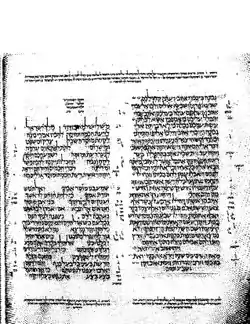| Proverbs 27 | |
|---|---|
 The whole Book of Proverbs in the Leningrad Codex (1008 C.E.) from an old fascimile edition. | |
| Book | Book of Proverbs |
| Category | Ketuvim |
| Christian Bible part | Old Testament |
| Order in the Christian part | 21 |
Proverbs 27 is the 27th chapter of the Book of Proverbs in the Hebrew Bible or the Old Testament of the Christian Bible.[1][2] The book is a compilation of several wisdom literature collections, with the heading in 1:1 may be intended to regard Solomon as the traditional author of the whole book, but the dates of the individual collections are difficult to determine, and the book probably obtained its final shape in the post-exilic period.[3] This chapter is the last part of the fifth collection of the book,[4] so-called "the Second Solomonic Collection."[5]
Text
The original text is written in Hebrew language. This chapter is divided into 27 verses.
Textual witnesses
Some early manuscripts containing the text of this chapter in Hebrew are of the Masoretic Text, which includes the Aleppo Codex (10th century), and Codex Leningradensis (1008).[6]
There is also a translation into Koine Greek known as the Septuagint, made in the last few centuries BC; some extant ancient manuscripts of this version include Codex Vaticanus (B; B; 4th century), Codex Sinaiticus (S; BHK: S; 4th century), and Codex Alexandrinus (A; A; 5th century).[7]
Analysis
This chapter belongs to a further collection of Solomonic proverbs, transmitted and edited by royal scribes during the reign of Hezekiah, comprising Proverbs 25–29.[8] Based on differences in style and subject-matter there could be two originally separate collections:[8]
- Proverbs 25–27: characterized by many similes and the 'earthy' tone
- Proverbs 28–29: characterized by many antithetical sayings and the predominantly 'moral and religious' tone (cf. Proverbs 10–15)
The New King James Version adopts verse 7 as a sub-heading for this chapter,[9] reflecting the argument from Methodist minister Arno Gaebelein that this section represents "instructions given to Solomon".[10] Verses 23 to 27 are distinct and commend the life of a shepherd "as providing the best and most enduring kind of wealth".[11]
Verse 1
- Do not boast about tomorrow,
- for you do not know what a day may bring forth.[12]
- "Do not boast": from Hebrew: אַל־תִּתְהַלֵּל, romanized: ʾal tithallel, in the Hitpael jussive negated form of the common verb “to praise,” or in this setting means “to praise oneself” or “to boast.” [13]
- "A day": Perowne notes that the Septuagint refers to "the day" (Greek: ἡ ἐπιοῦσα, hē epiousa), meaning the next day, but he considers "a day", meaning " a future day", to be a preferable translation.[14]
Verse 20
- Sheol and Abaddon are never satisfied,
- and never satisfied are the eyes of man.[15]
See also
- Related Bible parts: Exodus 22, Leviticus 25, Proverbs 10, Proverbs 15, Proverbs 25
References
- ↑ Halley 1965, p. 270.
- ↑ Holman Illustrated Bible Handbook. Holman Bible Publishers, Nashville, Tennessee. 2012.
- ↑ Aitken 2007, p. 406.
- ↑ Perdue, L. G. (2012), Proverbs, pp. x–xi
- ↑ Aitken 2007, pp. 406, 419.
- ↑ Würthwein 1995, pp. 36–37.
- ↑ Würthwein 1995, pp. 73–74.
- 1 2 Aitken 2007, p. 419.
- ↑ Sub-heading at Proverbs 27:1, NKJV
- ↑ Gaebelein, A. (1919), Gaebelein's Annotated Bible: Proverbs 27, accessed 5 May 2021
- 1 2 Aitken 2007, p. 420.
- ↑ Proverbs 27:1 MEV
- ↑ Note [a] on Proverbs 27:1 in NET Bible
- ↑ Perowne, T. T., Cambridge Bible for Schools and Colleges: Proverbs 27, accessed 5 May 2021
- ↑ Proverbs 27:20 ESV
- ↑ Note on Proverbs 27:20 in NKJV
Sources
- Aitken, K. T. (2007). "19. Proverbs". In Barton, John; Muddiman, John (eds.). The Oxford Bible Commentary (first (paperback) ed.). Oxford University Press. pp. 405–422. ISBN 978-0199277186. Retrieved February 6, 2019.
- Alter, Robert (2010). The Wisdom Books: Job, Proverbs, and Ecclesiastes: A Translation with Commentary. W.W. Norton & Co. ISBN 978-0393080735.
- Coogan, Michael David (2007). Coogan, Michael David; Brettler, Marc Zvi; Newsom, Carol Ann; Perkins, Pheme (eds.). The New Oxford Annotated Bible with the Apocryphal/Deuterocanonical Books: New Revised Standard Version, Issue 48 (Augmented 3rd ed.). Oxford University Press. ISBN 9780195288810.
- Farmer, Kathleen A. (1998). "The Wisdom Books". In McKenzie, Steven L.; Graham, Matt Patrick (eds.). The Hebrew Bible Today: An Introduction to Critical Issues. Westminster John Knox Press. ISBN 978-0-66425652-4.
- Fox, Michael V. (2009). Proverbs 10-31: A New Translation with Introduction and Commentary. Anchor Yale Bible Commentaries. Yale University Press. ISBN 978-0300155563.
- Halley, Henry H. (1965). Halley's Bible Handbook: an abbreviated Bible commentary (24th (revised) ed.). Zondervan Publishing House. ISBN 0-310-25720-4.
- Perdue, Leo G. (2012). Proverbs Interpretation: A Bible Commentary for Teaching and Preaching. Presbyterian Publishing Corporation. ISBN 978-0664238841.
- Würthwein, Ernst (1995). The Text of the Old Testament. Translated by Rhodes, Erroll F. Grand Rapids, MI: Wm. B. Eerdmans. ISBN 0-8028-0788-7. Retrieved January 26, 2019.
External links
- Jewish translations:
- Mishlei - Proverbs - Chapter 27 (Judaica Press) translation [with Rashi's commentary] at Chabad.org
- Christian translations:
- Online Bible at GospelHall.org (ESV, KJV, Darby, American Standard Version, Bible in Basic English)
- Book of Proverbs Chapter 27 King James Version
 Book of Proverbs public domain audiobook at LibriVox Various versions
Book of Proverbs public domain audiobook at LibriVox Various versions